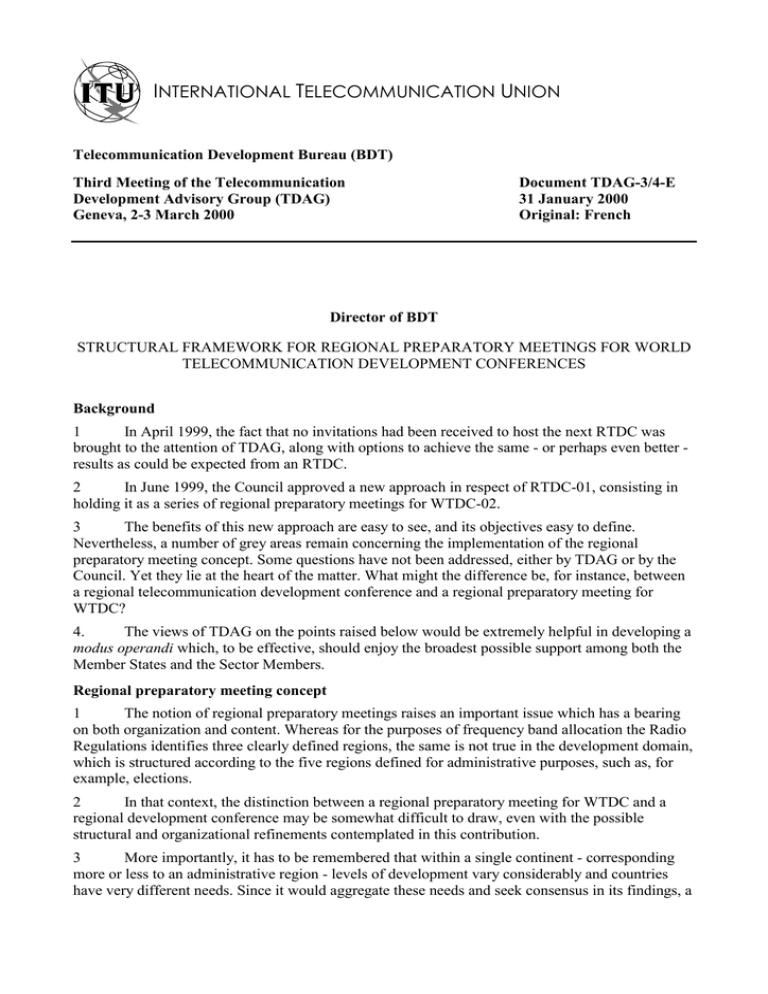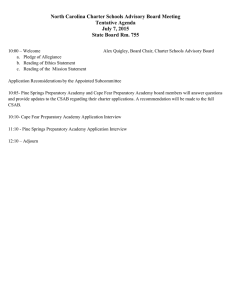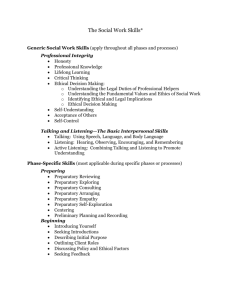I T U
advertisement

INTERNATIONAL TELECOMMUNICATION UNION Telecommunication Development Bureau (BDT) Third Meeting of the Telecommunication Development Advisory Group (TDAG) Geneva, 2-3 March 2000 Document TDAG-3/4-E 31 January 2000 Original: French Director of BDT STRUCTURAL FRAMEWORK FOR REGIONAL PREPARATORY MEETINGS FOR WORLD TELECOMMUNICATION DEVELOPMENT CONFERENCES Background 1 In April 1999, the fact that no invitations had been received to host the next RTDC was brought to the attention of TDAG, along with options to achieve the same - or perhaps even better results as could be expected from an RTDC. 2 In June 1999, the Council approved a new approach in respect of RTDC-01, consisting in holding it as a series of regional preparatory meetings for WTDC-02. 3 The benefits of this new approach are easy to see, and its objectives easy to define. Nevertheless, a number of grey areas remain concerning the implementation of the regional preparatory meeting concept. Some questions have not been addressed, either by TDAG or by the Council. Yet they lie at the heart of the matter. What might the difference be, for instance, between a regional telecommunication development conference and a regional preparatory meeting for WTDC? 4. The views of TDAG on the points raised below would be extremely helpful in developing a modus operandi which, to be effective, should enjoy the broadest possible support among both the Member States and the Sector Members. Regional preparatory meeting concept 1 The notion of regional preparatory meetings raises an important issue which has a bearing on both organization and content. Whereas for the purposes of frequency band allocation the Radio Regulations identifies three clearly defined regions, the same is not true in the development domain, which is structured according to the five regions defined for administrative purposes, such as, for example, elections. 2 In that context, the distinction between a regional preparatory meeting for WTDC and a regional development conference may be somewhat difficult to draw, even with the possible structural and organizational refinements contemplated in this contribution. 3 More importantly, it has to be remembered that within a single continent - corresponding more or less to an administrative region - levels of development vary considerably and countries have very different needs. Since it would aggregate these needs and seek consensus in its findings, a -2TDAG-3/4-E preparatory meeting would probably introduce factors liable to underestimate or, conversely, exaggerate development difficulties and obstacles in the region. In some cases, subregional preparatory meetings may offer a very attractive alternative. Objective of regional meetings 1 Apart from the savings on translation, volume of documentation and staff costs that might be made with the innovative approach approved by the Council, the prime objective which regional meetings seek to achieve is particularly effective preparation for WTDC-02. 2 The aim will be to rigorously identify the obstacles to telecommunication development and then match needs expressed to regional solutions within the framework of previously established priorities. Terms of reference of regional preparatory meetings 1 For the sake of credibility and effectiveness, regional preparatory meetings should retain the terms of reference entrusted to RTDCs, namely the capacity to evaluate the activities of the Development Sector in their region, set objectives and appropriate strategies accordingly, and study policy, organizational and operational questions from the regulatory, technical and financial standpoints. 2 In addition, regional meetings should be able to give advice to BDT and make recommendations to WTDC. The views of TDAG would help in clarifying the modus operandi for the innovative approach which it has suggested and the Council has adopted. Participation 1 Similarly, TDAG will wish to consider the question of participation in regional preparatory meetings. Several options may be contemplated, which are not mutually exclusive: 2 Participation may be governed by the prevailing provisions currently applicable to regional conferences. 3 The number of participants could be reduced by inviting the Member States of the region to send only a limited number of experts. 4 It may also be envisaged that, in order to facilitate the identification of regional solutions to the problem of development of telecommunications and information technologies, such experts might take the floor without their views necessarily reflecting the official position of their countries. 5 Conversely, participation could be extended, on invitation, to members of civil society whose development activities are very closely connected with telecommunications (ministerial departments, universities, research institutes, associations, NGOs, etc.). This is particularly true in respect of numerous applications such as telemedicine, tele-education and electronic commerce, and what has come to be known as telecommunications for development. Duration, procedures and conduct of preparatory meetings 1 In order to rationalize the proceedings and accomplish the work within a time-frame which would enable us to make significant savings, the possibility may be considered of applying, mutatis mutandis, some of the arrangements adopted elsewhere, in respect of the world telecommunication policy forum. 2 The duration of preparatory meetings could be limited to three days. Proceedings could be based on equal treatment of participants, who would be seated in alphabetical order, and the private sector would have the same speaking rights as the administrations. Work should be accomplished C:\TEMP\4-E.DOC (102587) 18.02.00 22.02.00 -3TDAG-3/4-E on a consensus basis, thereby avoiding the extremely time-consuming formalism associated with procedural motions and voting. 3 The question also arises of the agendas of such meetings, and their adoption. Several options may be contemplated: •= The first option, and the most cumbersome, would be to follow the procedures applicable to an RTDC •= The second option would be to entrust the Director of BDT with the task of drawing up the agenda and conducting a consultation of the Member States of the region concerned •= A third option would be to allow the Director to draw up the agenda on the basis of prior consultations carried out by the relevant regional office, leaving its adoption to the regional preparatory meeting itself. Organization and working methods 1 How preparatory meetings are organized constitutes one of the keys to their success. The role of the regional offices will be crucial in this respect. Being so close to the Member States and Sector Members and responsible for implementing programmes and other ad hoc activities, they constitute by definition a linchpin for the organization of such preparatory meetings. 2 The place and date of a preparatory meeting should be set by consultation between headquarters and the relevant regional office, but also with the regional and subregional telecommunication organizations. 3 The regional offices should prepare for consideration and evaluation a report on their activities, particularly in respect of implementation of the Valletta Action Plan (VAP). 4 For good management of the preparatory meetings in the short time available, it would be useful to draw up a list of the most pressing issues, through consultations conducted by the regional offices, in order to identify progress made in the regions, the obstacles that remain to be overcome and possible priorities. 5 The preparatory meetings could be structured around workshops on specific themes mandated to draw up conclusions on the particular issues entrusted to them. These conclusions could then be consolidated in the form of a report for submission to all the Member States and Sector Members of the regions concerned to serve as a basis for their proposals to WTDC. This exercise could be akin to indicative planning process which would facilitate deliberations at the next WTDC. Schedule of regional preparatory meetings 1 As things stand at the moment, a first regional preparatory meeting could be held between now and the end of the year 2000. Four meetings could be scheduled in 2001. 2 One slight variation on this would be to hold only three in 2001 and schedule the fourth at the beginning of 2002. On this question, as on all others, TDAG's views would be extremely valuable. _________________ C:\TEMP\4-E.DOC (102587) 18.02.00 22.02.00






